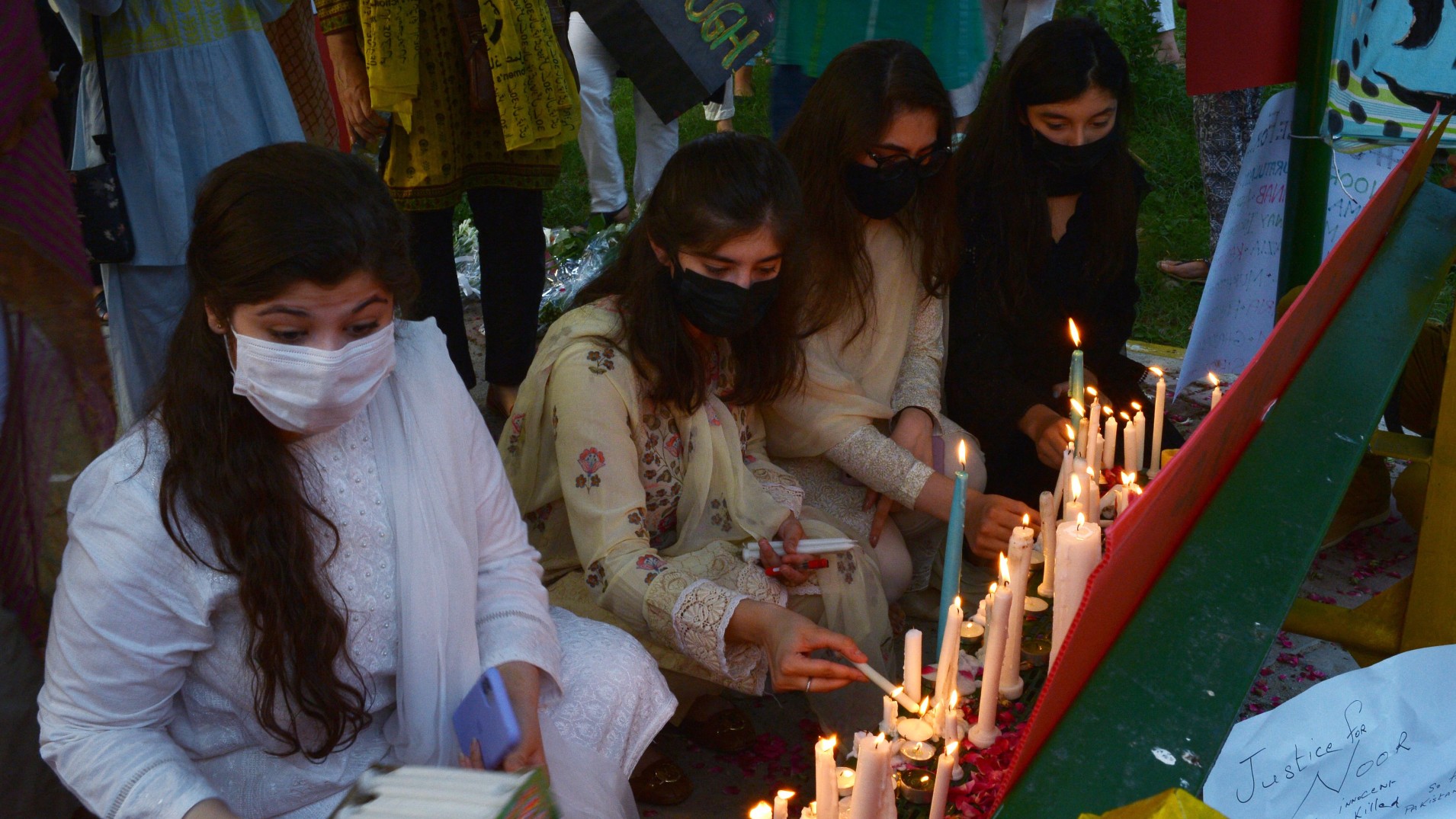What is gender terrorism?
Pakistani activists call for action on country’s high rate of gender-based violence

A free daily email with the biggest news stories of the day – and the best features from TheWeek.com
You are now subscribed
Your newsletter sign-up was successful
The murder of a former Pakistani diplomat’s daughter has led to calls for better protection of women and girls from so-called “gender terrorism”.
Noor Mukadam, 27, was allegedly held captive for three days at the apartment of a business tycoon’s son, Zahir Zakir Jaffer, in Islamabad. Jaffer has been arrested on suspicion of her pre-meditated murder and stands accused of torturing and beheading her, The Guardian reports.
The case has “forced Pakistan to confront its poor record on gender-based violence”, says the newspaper. Former Pakistani diplomat Shaukat Ali Mukadam described his daughter as a “gentle, kind girl”, and said that “now we are fighting for all women because this could be anybody’s daughter or sister.”
The Week
Escape your echo chamber. Get the facts behind the news, plus analysis from multiple perspectives.

Sign up for The Week's Free Newsletters
From our morning news briefing to a weekly Good News Newsletter, get the best of The Week delivered directly to your inbox.
From our morning news briefing to a weekly Good News Newsletter, get the best of The Week delivered directly to your inbox.
The World Economic Forum’s (WEF) 2021 Global Gender Gap Index ranks Pakistan at 153 out of 156 countries, with only Iraq, Yemen and Afghanistan performing worse. It said that 85% of women have suffered intimate partner violence, a much higher proportion than even the three lowest-ranking countries.
What does ‘gender terrorism’ mean?
Activist Leena Ghani said that women in Pakistan are facing “a gender terrorism epidemic”, and stressed that more women’s lives should not be lost in order for the country to “learn a lesson about gender-based violence”, The Guardian reports.
The Pakistan 2020 Human Rights Report notes that “no specific federal law prohibits domestic violence” or female genital mutilation in the country, and women are “victims of various types of societal violence and abuse, including so-called honour killings, forced marriages and conversions, imposed isolation” as well as being “used as chattel to settle tribal disputes”. The level of violence disproportionately experienced by women is what has led activists to refer to such crimes as acts of “gender terrorism”.
A free daily email with the biggest news stories of the day – and the best features from TheWeek.com
“Noor’s case is not an isolated incident”, said Ghani, who uses the term “gender terrorism” to refer to widespread violence against women and girls, many of which offences never result in prosecution of the perpetrator. Almost 2.5% of all cases of domestic violence result in a conviction rate, according to the White Ribbon charity, which works to end male violence against women.
“The recent surge in crime against women also points a finger at the complicity of the state for its inability, or even a lack of desire, to protect women,” says The Diplomat, a US-based website for the Asia-Pacific region. Prime Minister Imran Khan has been criticised for suggesting women should dress modestly to protect themselves from violent attacks. “If a woman is wearing very few clothes it will have an impact on the man unless they are robots,” Khan said during an HBO interview in June 2021.
The country’s political sphere remains disproportionately male dominated, with 10.7% of the country’s ministerial positions held by women, compared to 89.3% held by men, according to the WEF report. Pakistani women “do not have equal access to justice”, it concluded.
Links to misogynist terrorism
German newspaper Deutsche Welle says that Mukadam's death has exposed a culture of “toxic misogyny” in Pakistan. But it is not a geographically isolated phenomenon.
Since 2014, men labelling themselves as “involuntary celibates” – or “incels” – have “carried out mass killings” in the US and Canada, The Guardian reports, with as many as 50 lives claimed due to incel-related crimes. Incels are “deeply misogynistic men who believe women are to blame for their lack of sexual intimacy”, says GQ, and the ideology has led to cases of women experiencing both verbal, and in more extreme circumstances, physical abuse.
The movement has begun to be treated “as a more serious terrorism threat” by authorities in recent years, The Guardian explains. Think tank New America – in a joint publication with the Institute for Research on Male Supremacism – recognises misogynist incel violence and terrorism as “a form of male supremacism”.
Debate over the use of the term “terrorism” in relation to incel ideology has followed, with critics arguing that it has given “too much attention and significance to a fringe movement”, New America continues. But executive director of the Institute for Research on Male Supremacism Alex DiBranco has said that incel-related violence is “not being taken as seriously as it needs to be”, The Guardian reports.
Recommendations to tackle misogynist incel violence, made by DiBranco and the co-authors of the New America report, include improving access to resources for mental health services – but the authors warn that mental health issues should not be approached “as the main driver of misogynist violence”. Indeed, DiBranco has said: “This is an ideology. It’s not a psychological disorder,” The Guardian reports.
Julia O'Driscoll is the engagement editor. She covers UK and world news, as well as writing lifestyle and travel features. She regularly appears on “The Week Unwrapped” podcast, and hosted The Week's short-form documentary podcast, “The Overview”. Julia was previously the content and social media editor at sustainability consultancy Eco-Age, where she interviewed prominent voices in sustainable fashion and climate movements. She has a master's in liberal arts from Bristol University, and spent a year studying at Charles University in Prague.